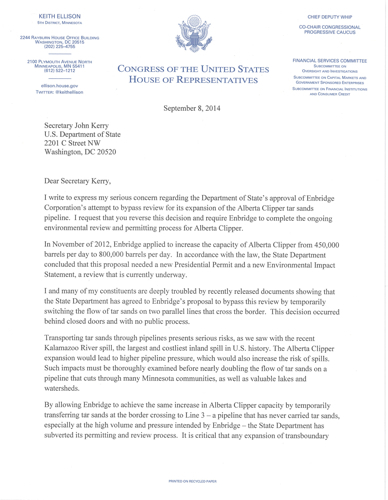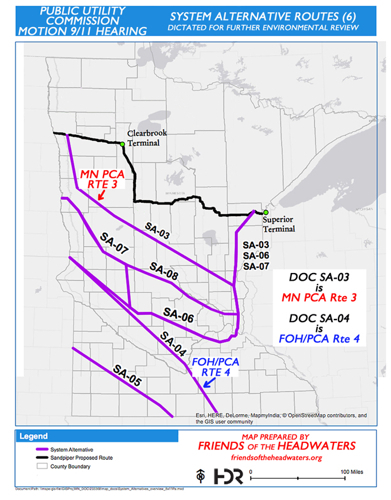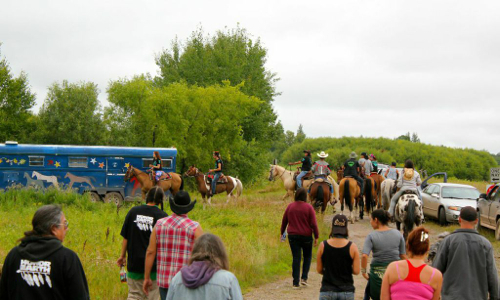Last Thursday The Minnesota Public Utilities Commission (PUC), in a 3-2 decision, vexed the Enbridge Energy Corporation and encouraged environmental activists opposed to the $2.6 billion Sandpiper Pipeline. Regulators agreed that there was room to explore six alternate pipeline routes which would remove the threat to the headwaters of the Mississippi River, Native American (First Nation) rice beds and treaty lands, as well as the expansive network of wetlands and lakes which are the signature of Minnesota's famous "land of ten thousand lakes." As recently as May, no one thought it was possible to force a rerouting of the giant Canadian company's plans to take the shortest and cheapest route to refineries on Lake Superior. Opponents argued that Enbridge does not have the infrastructure in place on Superior to handle the up to 225,000 barrels of oil a day that would flow 616 miles from the Bakken oil fields of North Dakota.
Voices were heard loud and clear in the PUC offices and in small communities across the northland. Honor the Earth's "Love Water Not Oil Tour," a 200-mile horseback journey across northern Minnesota, was a media success. The ride highlighted the bio-diversity of the untouched landscape that would host Enbridge's preferred route, and which would avoid highways, keeping the pipeline out of sight and out of mind.
In a letter to the Minneapolis Star Tribune, a volunteer attorney for the non-profit Friends of the Headwaters (FOH) addressed the dangers of the proposed pipeline.
"Many people think that building pipelines will get oil off the rails and avoid explosions such as the one last year in Lac Megantic, Quebec, where a train derailed and killed 47 people. Unfortunately, building a pipeline across Minnesota is not likely to stop oil by rail. Most of the oil trains rolling through Minnesota go to East Coast refineries, because these refineries are designed for the kind of oil that comes from North Dakota. Yet, no pipelines currently go anywhere near these refineries, and none are planned. Instead, they are served only by rail or ships."
No one wants to see a major oil disaster in the Great Lakes, which contains one-fifth of the world's supply of surface fresh water and 54 percent of the world's liquid fresh water by volume.
In addition, the remote routing of Enbridge's preferred line has the Minnesota Pollution Control Agency (MPCA) and the PUC worried about land spills. "These agencies are very concerned about the threat of spills, especially because many parts of Enbridge's route cut through wetlands and areas far from roads, making response to ruptures very difficult," the FOH attorney says.
In a separate issue, Enbridge announced its intention to locate a "rebuild" of its existing LINE 3 and route it along the Sandpiper. "So, if they get the Sandpiper route they've proposed, this route through Minnesota's lakes and the Mississippi Headwaters will become the 'go to' route for the umpteen oil pipelines to follow, including those carrying tar sands," according to FOH.
"The Line 3 Replacement Program will replace the existing 34-inch-diameter pipeline with a 36-inch-diameter pipeline from Hardisty to Gretna on the Canadian side, and from Neche, N.D., to Superior on the U.S. side. Segments of Line 3 from the Canadian border to Neche, N.D., and near the Minnesota-Wisconsin border to the Superior terminal, are being replaced under separate segment replacement projects. The total length of pipeline replacement is 1,031 miles (1,660 kilometres)."
MN Representative Keith Ellison recently sent a letter to Secretary of State John Kerry about the Enbridge pipeline scenario and the troubling expansion of LINE 3 which was OK'd by the State Department to increase the capacity of the Alberta Clipper from 450,000 barrels per day to 800,000 bpd without completing the environmental review and permitting process. "The decision occurred behind closed doors and with no public process," Ellison wrote.

Combine all of the proposed and existing Enbridge pipelines and the Keystone XL seems like child's play.
Activists say that they are not opposed to all pipelines, but that lack of infrastructure and the desire to move as much oil as quickly as possible is a bad combination.
"These are very dangerous activities in a very sensitive place," attorney Frank Bibeau told the Star Tribune.
Bibeau, one of the Honor the Earth organizers, called for a designated corridor for pipelines in Minnesota. In a press release Bibeau said the proposed pipeline is a "catastrophe about to happen."
Winona LaDuke explores the shaky math and the dangers of so much oil moving through so little reliable infrastructure in "A Pipeline Runs Through It."
LaDuke also questions the final destination of all of that oil. It turns out the US may be exporting a valuable commodity. So much for energy independence.
"It is also not clear where that oil is going, since the US is now one of the largest producers of oil, and it turns out, we're exporting six times as much finished petroleum products (2.1 million barrels of oil per day) as the 'need' for the Sandpiper (as one example) expects to carry for America's energy security."
Forbes explains, "As background you need to understand that US produced crude cannot be exported but refined products (gasoline, avgas (aviation gasoline), heating oil, all those sorts of things) produced from US crude can be exported."
Minnesota's property owners and indigenous societies have been heard loud and clear. The PUC ordered that the alternative routes be given serious consideration. Even if Enbridge's original route is chosen, it still faces possible modifications and an additional two rounds of hearings.
Minnesota readers will be interested in a fundraiser sponsored by FOH and headlined by Prudence Johnson on Saturday September 20 in Nevis Minnesota. Prudence Johnson is a Minneapolis performer with a repertoire that includes the American songbook, big band standards, and duets with Garrison Keillor on Prairie Home Companion. Details can be found at the FOH website.



